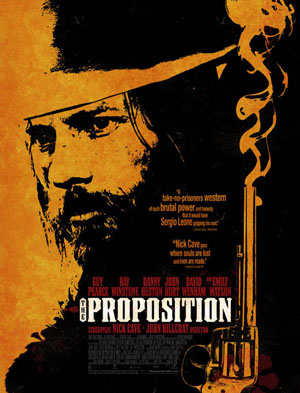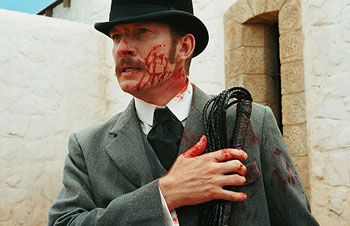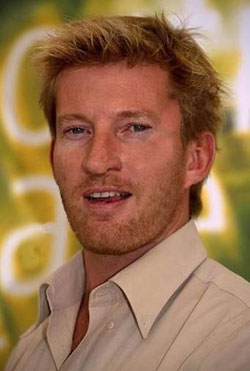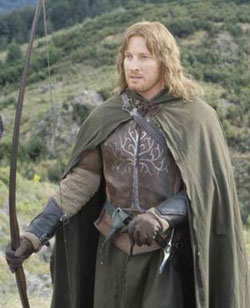 The Proposition
The Proposition
is a grimy, violent film set in the deserts of Australia back in the
1880s. It’s basically about that nation’s Old West, and it’s a grim
story of betrayal, bloodshed and badasses. Aussie director John
Hillcoat takes Nick Cave’s script (yes, that Nick Cave) and evokes the
dusty, gory past – greatly aided by a fantastic cast that includes Guy
Pearce, Danny Huston, Emily Watson, John Hurt and David Wenham.
Wenham’s
probably best know to readers of this site as Faramir, the ranger of
Gondor whose dad sent him to die on the plains outside of Mordor in Lord of the Rings. The unlucky will know him as Carl, the monk from Van Helsing. He’s got a wide and varied filmography, which will soon include the Frank Miller adaptation 300.
Wenham was in LA, doing voice over for 300, when I talked to him on the phone about The Proposition, his career and the hazards of being a character actor.
Q: Your character in The Proposition is a real city slicker scumbag, isn’t he?
Wenham: [laughs] That’s one way of putting it!
Q: How would you put it?
Wenham:
He controls virtually all the money in the town. It’s a relatively new
community there, and because it’s relatively new and in a harsh
environment, as you see in the film, he’s somebody who sees events that
occurs in that community in very black and white terms and acts
accordingly.
Q: Can you understand where he’s coming from?
Wenham:
I can only understand him if I think about the environment back then,
in the 1880s in the middle of the Australian desert, with all the harsh
environmental elements at play there, and the fact that all these
people from England and Ireland and wherever happened to have come to
this part of the world. They were essentially aliens, and they were
fighting against this landscape, so I can understand that there was
lawlessness so he had to put in place a system that was black and white
purely for survival. From that point of view, I can understand him.
But
through today’s eyes and today’s social conscience and the morality of
today, nah, he obviously comes across as a heartless son of a bitch.
 Q:
Q:
Forgive my American ignorance, but what’s the modern Australian
relationship with that time period? It’s the beginning of the nation
but it’s also filled with racism and brutality.
Wenham: We’re
a country that’s only 200 years old, and the film’s set in 1880, so
it’s relatively early in Australian development. Especially out there,
people were laws unto themselves. We did have, as you do in this
country here, outlaws. Our film history is littered with those, the
most famous being a guy called Ned Kelly, who Heath Ledger played not
long ago.
Q: In America
our outlaws and their time period, the Old West, are heavily
mythologized. Is it the same in Australia? Do kids grow up playing
games set in that period?
Wenham:
Not as much. Strangely enough, although there were a lot of outlaws in
that period of our history only a few have made their way into the
Australian story. As I said, the most famous is Ned Kelly. It’s strange
that we revere someone like that – he was a really nasty character; he
was violent, he was a criminal. But for some strange reason he’s grown
into our folklore.
Q: What was the shoot like? Everything looks so authentic.
Wenham:
What’s great about it, in terms of pure authenticity, is that we shot
at a place called Wyndham. The time that I was there the daily
temperature each day hovered around 40 degrees Celsius. I don’t know
what that is in Fahrenheit, but it’s well and truly above a hundred.
Well and truly. You could let the heat dictate how you would act and
react in those circumstances.
Something
strange for me, and I come from Australia, is that I have never seen so
many flies in my life as in that location. There were literally
thousands of them the whole time and they were constant. They never
left you alone. The only thing we found effective was this cream they
actually put on horse’s backsides to keep the flies away from them and
to prevent them from becoming flyblown. If we put that on us, the flies
wouldn’t actually land on you, they would just hover near you. That
gives a real visceral feel to the film – the fact that we did shoot in
this really harsh climate, with the flies and with the heat, with the
sweat and with the fact that we were working very long hours under
those conditions really added to the texture of the film.
Q: People who see Van Helsing won’t realize you’re the same guy in this movie, and they won’t realize you’re the same guy in Lord of the Rings. How important to as an actor is it that you can get these very different roles?
Wenham:
I think it’s just happened that way. As an actor I am drawn to
characters and stories that interest me for various reasons, and I want
to be challenged by various characters. I never want to go over the
same terrain twice. I want to challenge myself as an actor, and I like
to disappear inside characters. It’s just happened that when I look
back over my career there is a great range of characters.
Q: Does that make it tougher for you when you are trying to get new jobs, because you don’t have one specific image?
you don’t have one specific image?
Wenham: In
all honesty I think it does confuse people. It would be far easier, I
think, if I constantly played in a far more limited range, and if
casting people and directors could be able to see me as a distinctive
character. There’s a double edged sword there. I like the fact that I
can play a wide range of characters, but for me it does make it more
difficult to get what I want.
Q: This film is so authentic, and the set was so authentic. I visited the set of your next film, 300, and it’s just about the opposite of authentic; you’re playing in front of these giant sheets. What’s that like?
Wenham:
Your expectation of what it would be like was completely different from
the actual reality. The fact is that while we didn’t have the physical
environment there, we had all the people that were playing characters
within the film. You were never pretending to play opposite Leonidas.
From an acting point of view, it was relatively easy because all you
had to do was communicate with your fellow actors. Everything else, the
environment and everything, was going to be dropped in later, so it
wasn’t as hard as one would imagine. When you’re doing blue screen and
green screen work it’s much more difficult when there’s absolutely
nothing there. When you’re pretending to react to a dinosaur that’s
running at you, that’s when it becomes difficult. But we never actually
had that with this film.
Having said that, filming in a room constantly surrounded by the same colors does start to have a strange effect on your mind.
Q:
One of the things that was interesting about visiting that set was that
everybody essentially naked the whole time. Were you in that kind of
costume?
Wenham: Close to, yeah. Close to.
Q: How was it coming to work everyday and taking off everything?
Wenham:
When I was cast in the film, I have to admit, I didn’t know terribly
much about the source material. It was only after I was cast that I had
a look at Frank Miller’s graphic novel and then I realized what sort of
costume I’d be wearing throughout. In Frank’s book my first appearance
was completely in the nude and then leather underpants, essentially. I
did push the freak out button for a second, but we were all there – I
think there were five or six main cast and about 50 stunt guys – we
were all there for weeks before we started principal photography and
had a very heavy training regime. So we were all relatively comfortable
with our bodies before we put them on screen.
Q: What’s next? Anything lined up?
Wenham: Not yet. I’m just here putting down the narration for 300 and taking meetings and seeing what’s around at the present time. Hopefully something fabulous will come along.
Q: What’s your ideal career move at this time? Is it to get more leading roles or to stay as a character actor?
Wenham:
In an ideal world I’d love to do both. Throughout a 12 month period I’d
love to play one leading role and one really fabulous character role.
One of each every year is great, more than that would be a wonderful
bonus. But it’s so hard to find those roles. I read a lot of  material but it’s rare that I come across something I really respond to and am desperate to do.
material but it’s rare that I come across something I really respond to and am desperate to do.
We
have a problem with the film industry back in Australia, and we’re very
hard on ourselves back there. Then I come here and realize it’s a
worldwide phenomena – it’s very difficult to write a great script. I
take my hat off to writers of great ability, because I understand how
difficult it is. When you do come across one it’s a needle in a
haystack.
Q: You’ve done some great comedic roles – are you more comfortable in comedy or in drama?
Wenham:
I don’t really have a genre I feel more comfortable with. I really
don’t. It really just depends where I’m at at a particular time.
Q: Have you thought about producing, or trying your own hand in screenwriting?
Wenham:
I’ve actually been involved in producing in the past. I’ve produced
three films I’ve actually been in. That’s a very interesting journey
for me, because you’re in control of your own destiny to a point. I was
actually invited to become involved in producing through the great
Australian producer John Maynard, who produced a lot of Jane Campion’s
films. He’s a bit of legend on the other side of the world. That was a
great opportunity for me to learn as much as I can about the other side
of the camera. I am an actor who is also a frustrated director. John
and his business partner have an open invitation to produce a film I
want to direct; it’s just about finding what I want to do at this
point. I’m always on the hunt and I’m in no particular hurry.
Q:
I imagine as a frustrated director you pay a lot of attention to the
directors you’re working with, and you’ve worked with some greats. Who
has taught you the most?
Wenham:
I learn from every job – you pick up the things that inspire you, or
you can become aware of somebody’s bad habits. The obvious one is Peter
Jackson; you can’t help but admire this man’s immense talents and
incredible achievements. To be on set of Lord of the Rings and to see
him in front of his tremendous bank of monitors, directing main unit
but also knowing what was happening on sets and locations all across
the country being beamed in by satellite was truly inspiring. Baz
Luhrmann was another one; his infectious energy and amazing imagination
and creativity are pretty awesome.
Q: Looking back at the Lord of the Rings, is that something you think you can top?
Wenham:
I try not to compare projects. That is something that will always stand
alone. I was in the gym here in Los Angeles the other day and a crew
member who worked on the film happened to be on the rowing machine next
to me. We started to talk about the project, and we both agreed that
it’s slightly surreal that we were part of that project for so long. It
becomes part of your life and yet it doesn’t; it’s become something
bigger than itself, in a sense. It’s an incredible piece of cinema that
will always be there for the rest of history, and we were part of it.
We pinch ourselves.